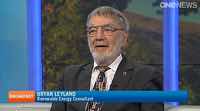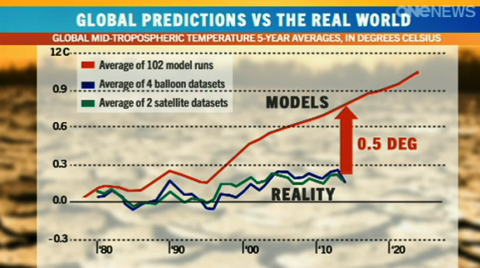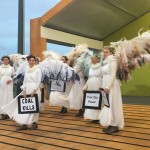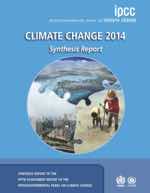 In an appalling lapse of editorial judgement, TVNZ has given notorious Climate “Science” Coalition propagandist Bryan Leyland four minutes of airtime this morning [TVNZ page removed: but available here.] to rubbish the work of the IPCC. Yes, that’s right, the nation’s public broadcaster presented a man way out on the crank fringe who has made a late-life career out climate denial, against one of the largest scientific undertakings of all time — the IPCC’s Fifth Assessment Report. The IPCC, lest we forget, warned yesterday that world faces “severe, pervasive and irreversible” damage from climate change unless we cut emissions steeply.
In an appalling lapse of editorial judgement, TVNZ has given notorious Climate “Science” Coalition propagandist Bryan Leyland four minutes of airtime this morning [TVNZ page removed: but available here.] to rubbish the work of the IPCC. Yes, that’s right, the nation’s public broadcaster presented a man way out on the crank fringe who has made a late-life career out climate denial, against one of the largest scientific undertakings of all time — the IPCC’s Fifth Assessment Report. The IPCC, lest we forget, warned yesterday that world faces “severe, pervasive and irreversible” damage from climate change unless we cut emissions steeply.
Leyland was allowed to lie about about computer models and modellers, present a shonky graph, claim that increasing carbon dioxide in the atmosphere was a “huge benefit” to agriculture, and completely misrepresent the scientific consensus on the reality of warming. The presenter, Rawdon Christie, did try a little scripted pushback early in the piece, but was woefully underprepared to deal with a Leyland obviously gleeful at his opportunity to spout nonsense to the nation.
Here a list of Leyland’s lies, roughly transcribed from the video:
“Everything’s based on computer models – they’re programmed to show warming”
No they’re not. One of the oldest climate lies on the block, and Leyland uses it shamelessly. Worse, he’s allowed to get away with it by a woefully underprepared presenter.
Models predicted warming and it hasn’t happened [with graphic ((Leyland’s shonky graph:

It appears to be a thinly-disguised and uncredited reworking of a graph that first appeared in the Wall Street Journal in February of this year, accompanying an op-ed piece by John Christy — itself a tidying up of a long-debunked graph created by Roy Spencer.))]
Warming continues: ice melts, sea levels rise and oceans warm
No indications of rate increase in sea level rise
Sea level rise has accelerated, and is expected to accelerate further as warming continues and ice sheets disintegrate.
Computer modellers are a small group — everyone else just goes along with them.
Absolute nonsense. This is a childish and overtly conspiracist misrepresentation of reality.
We’re entering a cooling period.
Another piece of wild nonsense from Leyland, betraying his parlous relationship with reality, and allowed to pass unchallenged by the presenter.
Increasing CO2 has been a huge benefit to plant growth — “not doing us any harm”
More completely made-up nonsense, allowed to pass unchallenged by Christie.
None of this is unexpected from Leyland. He has a long track record of persuading the more gullible NZ media to give him a platform to mislead, misrepresent and play fast and loose with the facts. TVNZ must have been aware of his notoriety, which makes their decision to present him on screen as “a renewable energy expert” grossly misleading and very likely a breach of broadcasting standards ((Should you wish to make a complaint against the programme, you may do so here.)).
But the biggest editorial lapse of all was the decision to put him on the show at all. Leyland is a lonely man out on the crank fringes of climate denial. To suggest that he has any sort of valid view on the reality of climate change — to set him up against the work of thousands of scientists around the world and the entire NZ scientific community — was outrageous. Climate change is far too serious an issue for the planet for a responsible broadcaster to play silly false balance games. They must broadcast an immediate correction and apology, and in future treat the issue with the seriousness it deserves.
[Update 5pm: It appears TVNZ have pulled the video of Leyland’s interview and the accompanying news story from their site in response to the many formal and informal complaints they have received. However the full interview can be seen (for the time being, at least) on Youtube. And the TVNZ News Facebook post about Leyland’s interview is still there.]
Like this:
Like Loading...
 What can I add to the millions of words in dozens of languages that have already been written by the thousands of journalists and commentators around the Paris Agreement? We now have a globally binding agreement that really looks like it could curtail the use of a fuel that has been central to our way of life for more than 150 years.
What can I add to the millions of words in dozens of languages that have already been written by the thousands of journalists and commentators around the Paris Agreement? We now have a globally binding agreement that really looks like it could curtail the use of a fuel that has been central to our way of life for more than 150 years.
 One of the most beautiful things I saw on my facebook feed last week were some angels at Republique, the scene of the attacks last month. Those same angels appeared at the entrance to the UN zone at the climate talks out at Le Bourget the other day as we walked into the centre. Today it was the Greenpeace polar bear, Aurora, roaring at everyone. But whatever is set up to amuse us on the way in, there’s no getting around it: we’re heading to the pointy end of the Paris agreement, and it’s no longer really about pictures. It’s all about words. The text.
One of the most beautiful things I saw on my facebook feed last week were some angels at Republique, the scene of the attacks last month. Those same angels appeared at the entrance to the UN zone at the climate talks out at Le Bourget the other day as we walked into the centre. Today it was the Greenpeace polar bear, Aurora, roaring at everyone. But whatever is set up to amuse us on the way in, there’s no getting around it: we’re heading to the pointy end of the Paris agreement, and it’s no longer really about pictures. It’s all about words. The text. In an appalling lapse of editorial judgement, TVNZ has given notorious Climate “Science” Coalition propagandist
In an appalling lapse of editorial judgement, TVNZ has given notorious Climate “Science” Coalition propagandist 
 The IPCC’s Fifth Report process reached its climax in Copenhagen yesterday with the release of the final “synthesis” report (download
The IPCC’s Fifth Report process reached its climax in Copenhagen yesterday with the release of the final “synthesis” report (download 
 So, the threat of a terrorist attack on New Zealand i
So, the threat of a terrorist attack on New Zealand i
You must be logged in to post a comment.